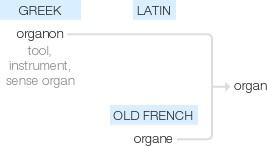Organ
late Old English, via Latin from Greek organon ‘tool, instrument, sense organ’, reinforced in Middle English by Old French organe .
wiktionary
From Middle English organe, from Old French organe, from Latin organum, from Ancient Greek ὄργανον(órganon, “an instrument, implement, tool, also an organ of sense or apprehension, an organ of the body, also a musical instrument, an organ”), from Proto-Indo-European *werǵ-. Doublet of organon, organum, and orgue.
etymonline
organ (n.)
fusion of late Old English organe, and Old French orgene (12c.), both meaning "musical instrument," both from Latin organa, plural of organum "a musical instrument," from Greek organon "implement, tool for making or doing; musical instrument; organ of sense, organ of the body," literally "that with which one works," from PIE *werg-ano-, from root *werg- "to do."
Applied vaguely in late Old English to musical instruments; by late 14c. the sense of the word (used in both singular and plural form) narrowed to the large, complicated musical instrument now known by that name (involving pipes sounded by means of compressed air supplied by a bellows and worked by means of keys), though Augustine (c. 400) knew this as a specific sense of Latin organa.
The biological meaning "body part of a human or animal adapted to a certain function" is attested from late 14c., from a Medieval Latin sense of Latin organum. From early 15c. as "a tool, an instrument." The broad, etymological sense of "that which performs some function" is attested in English from 1540s. By 1788 as "a medium, an instrument of communication." Organ-grinder, "strolling musician who 'grinds' music on a barrel-organ" is attested by 1803.
